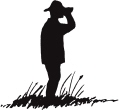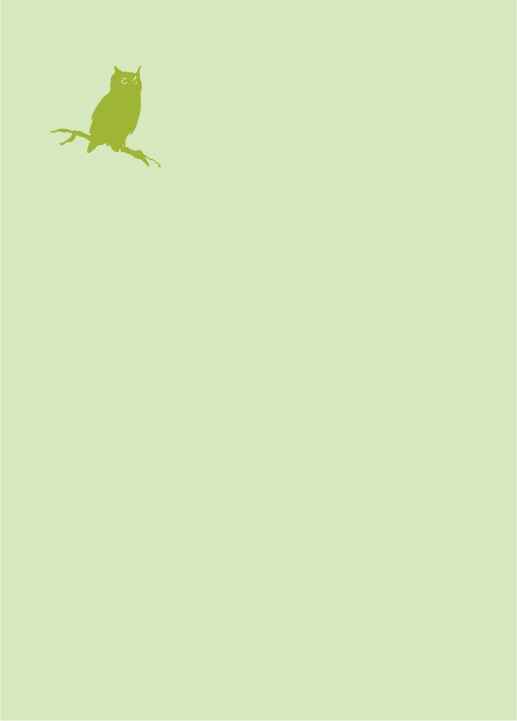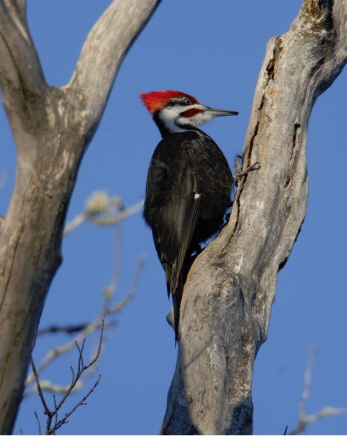The Reluctant Twitcher (3 page)


It's a tick.
â H
UGH
C
URRIE


To twitch, or not to twitch â that is the question.
â
H
ENRY
IX
, A
CT
77
“P
OPE IS STRICTLY FOR THE BIRDS
,” say some thoughtless wags, without stopping to consider why this might be so. My fateful connection with birds predates my birth. On a star-crossed morning in May of 1941, my father, Ernie, and two friends, Charlie Mol-ony and Ott Devitt, went to King City to investigate a Pileated Woodpecker's nest in a farmer's woodlot â a relatively harmless thing to do. This was before drugs and switch knives became the fashionable way for young men to spend a spring morning.
They took my mother with them, which was not unusual, except that she was some five months pregnant and her running skills were compromised by this fact. On the way back across the field the group was distracted by the crazed bellowing and clod-throwing antics of an enraged Jersey bull, which for some reason had taken umbrage at the invasion of his turf and was going ballistic. Mother, not a bull-lover at the best of times, was scared witless. There was but one tree in the field, a superannuated white pine, and the men somehow got my mother into the tree even though she was not what you would call a natural climber. Fear may have helped her. The bull charged and the men, too, got up the tree with an uncomfortably small grace period. An hour later the bull lost interest and wandered off looking for someone else to terrify. That's what they do; it's their thing.
It was some time before the men, armed with stones and a disconcertingly minuscule amount of bravado, were able to coax my mother down from the tree to make a run for the fence. And run my mother did, certain the bull was in hot pursuit the whole way. Even later in life she never recalled the episode dispassionately.
Leaving aside my unnatural attraction to Pileated Woodpeckers â my first “heard only” bird â and my incapacitating fear of all bulls, especially, but not exclusively Jerseys, let us rather note that in this episode we see the origin of the connection between me and birds. I never made a choice to become a birder. The gods willed it. They even make me fly frequently in my dreams. It can be exhausting.

Photo by
Sam Barone
.
Pileated Woodpecker (male). Algonquin Provincial Park. The red
moustachial stripe indicates this bird is a male.
Birding, as is widely known, is the fastest growing pastime in the Western world with well over fifty million participants in Canada and the United States alone. It has grown in quantum leaps since 2001. It is reported that 53,350,000 Americans feed wild birds (2006 National Survey of Fishing, Hunting, and Wildlife-Associated Recreation; report by the U.S. Fish and Wildlife Service). Throw in the Canadians and we're over fifty-five million! People become birdwatchers (slightly less serious) or birders (slightly more serious and sometimes approaching the manic; occasionally called “bird nerds” behind their backs, a term I shall henceforth eschew in this book) because birds are beautiful, numerous, and varied, and often available in one's own backyard. In colder climes, many people gaze mindlessly out their back windows all day long for up to six months of the year. Most mornings in May one can find people, like my friends George Fairfield and John Carley, crouched in the half darkness on their back porches staring intently off into the distance, patrolling for loons. They are part of Loon Watch. I leave you to draw your own conclusions, but tell me you don't know someone like that. What is not known is what occasionally pushes a relatively normal birder over the brink and turns him or her into a twitcher.
What exactly
is
a twitcher, you might ask. The big
Oxford
English Dictionary
defines it as “an instrument for clinching hog-rings.” This is not a meaning I favour. The porcine allusion seems quite superfluous. The
Concise Oxford Dictionary
defines it as “a birdwatcher who tries to get sightings of rare birds,” but also “a person or thing that twitches.” Though I use the term in this book in the first sense, you might be surprised how often the two meanings overlap. Twitchers range from the merely utterly possessed and driven to the certifiably insane, ready to kill without hesitation to see a real rarity. British twitchers have been known to abandon spouses at the altar to rush off to the Scilly Isles for some off-course migrant. The Scillies, not surprisingly, are known for their twitchers.
I am told there are some who might not even know what a Big Year is, hard to believe as this seems. A Big Year is a term widely used in the birding confraternity to describe the attempt to see some improbably high number of birds in a prescribed place in a single year. It can be any place â South Dakota, Nunavut, Rhode Island â downtown Moose Jaw for that matter.
I did my Big Year in Ontario, Canada, where the gold standard is to try to see three hundred birds in a year. It's not impossible, but it involves a lot of running around. Ontario is four times the size of Texas. Someone phones and says there's a possible Dovekie in Cornwall, so you whip off to Cornwall. Just after failing to find the Dovekie, you check the Internet in your cheap motel room with the cigarette burns on the bedspread and the pair of stalk eyes peering out of the sinkhole and learn there is an illusive Sprague's Pipit in Rainy River. Rainy River is exactly two thousand kilometres from Cornwall. You get the picture. You spend a lot of time in a car trying to figure out how to make things all right again with your family. Next time, if there is one, I may well try downtown Moose Jaw: Moosejavians, beware!
At 2:20 p.m. on October 24, 2007, while I was in my car â where else? â in hot pursuit of some bird I failed to see, it suddenly occurred to me that I should write up my Big Year in book form. Others have done so, in the United States, England, Australia, and possibly Burundi, probably with huge commercial success. Why not me? I did not stop to remember Graeme Gibson's lament that he was turned down by at least thirty-six publishers before getting one to seriously consider his wonderful
The Bedside Book of Birds
. I began my book that very evening after half a bottle of excellent California Zinfandel â 16.5 percent, if I recall correctly, possibly 17 percent; a “big zin” in any case. The result awaits you.
A portion of the revenues generated by this book will go to the Toronto Ornithological Club, the Pelee Island Bird Observatory, and the Ontario Field Ornithologists. buy this book. Give a copy to your mother, or if you have friends, to one or both of them.
And when you're out on the trail, mind you don't get between ol' Poper and a Kentucky Warbler.

The Horror! The Horror!
â J
OSEPH CONRAD
,
H
EART OF
D
ARKNESS
N
O, NOT COMMITTED AS you
understand it. That may come soon. They are after me, but they have not caught me yet and I am, to the contrary, still very much at large. But doing a Big Year frequently leads to being binned, so your thinking may not be too far off the mark. Big Years not uncommonly lead to increasingly bizarre behaviour and a steep descent into full-blown lunacy. The word
loon
inescapably comes to mind.
If ever temptation to do such a year should beckon, banish it immediately, my friends; failing that, for heaven's sake, keep it secret. Under no circumstances should you mention it to anybody, particularly a friend.
I, myself, you see, not only did not want to do a Big Year, but never even had the thought cross my mind. But often during 2006, my birding buddy Hugh Currie would say, “Now that you're going to be retired, you should do a Big Year in 2007.”
Every year is a Big Year for old Hughie, twitcher extraordinaire. I ignored these unwanted suggestions. I was not a twitcher, had no interest in becoming one, and secretly considered such people rather odd.
Finally, one day, to get him off the topic of my doing a Big Year, I off-handedly replied to his overture: “Yeah, I guess I should.” Meaning, of course, that yes, I
should
, even though I, in fact,
will not
. I never thought about it again.
In late December I had to go to England and only returned on January 11. On the twelfth, I happened to be talking to John Carley, a fellow member of the Toronto Ornithological Club, who “innocently” asked me how my Big Year was going.
“What Big Year?” I asked in horror.
“You're doing a Big Year this year because you're retired.”
“I am? Who told you that?”
“Hugh announced it at the last meeting of the club. Everyone knows.”
Oh, my God.
I began thinking like mad. How can I get out of this? I don't want to rush around like a madman. I just like poking around at my own speed, checking out the local birds when I feel like it. I don't need constant rarities. I actually like common birds. Though I would never tell anybody, unless being broken on a Catherine wheel, I even like Blue Jays. Yes, I know they can be “bad actors,” but I like them all the same. They have character.
